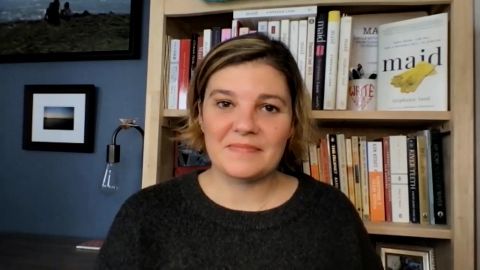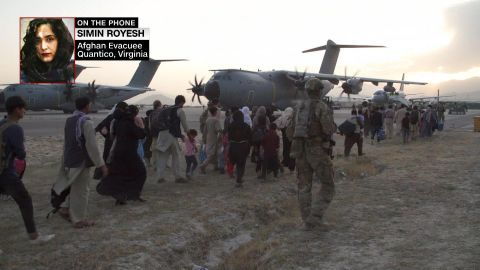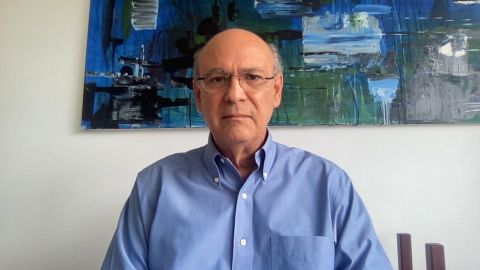Read Transcript EXPAND
CHRISTIANE AMANPOUR: And we turn now to another one, a story of strength and resilience. A new gut-wrenching Netflix show based on Stephanie Land’s memory “Maid: Hard Work, Low Pay, and a Mother’s Will to Survive.” It is making waves. The series exposes the harsh realities of living below the poverty line in America as it follows a young mother’s fight to escape an abusive relationship. It’s attracting a huge audience. And here is Stephanie Land speaking with Michel Martin about her journey.
(BEGIN VIDEO CLIP)
MICHEL MARTIN, CONTRIBUTOR: Thanks, Christiane. Stephanie Land, thank you so for joining us.
STEPHANIE LAND, AUTHOR, “MAID”: Thank you for having me. This is really incredible.
MARTIN: Well, I was going to ask you about that. Like, how do you wrap your head around this? I mean, a couple years ago, you were cleaning out folk’s dirty dishes and worse. And now, gosh, you’re the source material. You provided the source material for a hit series. It’s going to be one of the most successful that Netflix has ever put on. How to you wrap your head around that?
LAND: The amount of good reception that the series has just received has just been really surprising to me, honestly. Not only like a huge relief, but it’s really surprising and really incredible to see how many other stories are coming out and how much people are talking about their own experiences.
UNIDENTIFIED FEMALE: We need to get you off the streets. There’s it beds at the domestic violence shelter.
UNIDENTIFIED FEMALE: In hear, you can breathe.
UNIDENTIFIED FEMALE: I’m Alex. I’m trying to piece together how I got here.
My mom is undiagnosed bipolar and she’s MIA right now. I got into college. I wanted to be a writer. But I got pregnant. Now, I’m a single mom.
UNIDENTIFIED FEMALE: You’re broke.
UNIDENTIFIED FEMALE: No.
UNIDENTIFIED FEMALE: You got a problem with a background check?
UNIDENTIFIED FEMALE: No.
UNIDENTIFIED FEMALE: This is a trial.
UNIDENTIFIED FEMALE: Oh, I’m starting today.
UNIDENTIFIED FEMALE: That’s good news ability it, broke girl?
UNIDENTIFIED FEMALE: We composed. The bin is labeled composed. Can you read or should I show you?
UNIDENTIFIED FEMALE: I can read.
MARTIN: One thing that the book makes clear and that the T.V. series, I think, makes very clear for people who have never experienced this is just how close to the edge you can be and just how every financial decision can have a consequence, you know, every financial decision has to be so carefully thought through. Like — you know, like when you’re poor, you can never make a mistake, right? And I just wondered if you just talk a little bit about that or how you navigated that.
LAND: It always struck me that people would say that poor people need to learn how to budget. Because I was constantly budgeting in my head. The — how the series did, the little — the numbers going down the side, that was very accurate.
UNIDENTIFIED FEMALE: Uniform is $25. It comes out of your first check.
LAND: I remember standing in the grocery store and deciding whether or not I could afford a $2 sponge. And I was going through, not just my bank account, but like the two credit cards I had, like when is the payment going to post. Do I have anything left in there? And it was for a sponge. And I didn’t get it. Because, you know, I remembered that I needed tampons or, you know, something like that. And when you’re that close all the time, every decision is huge. You know, not even being — like your car not starting or a flat tire could mean thatyou don’t pay rent that month. And it’s such a precariousness and it’s stressful. I mean, it’s — I think IQ is lowered cognitively by like 20 points just from being in poverty. And people don’t think about that very often, I don’t think, anymore. We don’t talk about that as much. Just how much stress can affect a person. And when you’re constantly in survival mode, when, you know, you’re sitting up at night suddenly wondering like, oh, my goodness. Am I going to have enough to pay the electric bill? And it’s the middle of winter. What am I going to do? Because there’s — it’s not like you can just go get money from somewhere. And in my case, I couldn’t borrow money from people. I couldn’t ask my family for money. Even if it was $10.
MARTIN: Your book is about, you know, so many things. I mean, honestly, we could just talk for hours about all the threads that you tie together. You were in a relationship that was emotionally abusive. Could you just talk a little bit about what the impact of the relationship was and what the — what resulted after you left, like what happened after you left it?
LAND: The thing that caught me off guard was standing in court. And he — the judge was going to it decide whether or not to it grant my no contact order or order of protection. And he looked at my statement, which included all of the threats, you know, the punching out, the glass and the door, lots — it included a lot of things that I didn’t put in the book. And he said a reasonable person would not feel threatened. And so, I was called unreasonable in court. And then, he went on to call my abuser the more stable parent because he had the full-time job, he had the house that I had just left and he had the ability to take care of my kid. And I was homeless and didn’t have a job. Hadn’t had a job in a year because I was raising my baby. And so, suddenly, it was like I was the bad person for removing my child from a dangerous situation. That stuck with me for a long time. I mean, even — I didn’t really focus on the emotional abuse in the book mainly because I knew my kid was going to read it and I didn’t really think he deserved space on the page. But since the series has come out and that is such a focus of the series, I have been talking about it a lot more.
UNIDENTIFIED MALE: I do everything for you.
UNIDENTIFIED FEMALE: Before they hit you, they hit near you.
LAND: It’s been 15 years. And I don’t really think about him at all. But since I have been talking about it a lot and the abuse that I experienced, a lot has come up for me just in how it makes me feel and, you know, just kind of watching my body kind of remember a lot of what happened.
MARTIN: Well, one of the things I found so profound, frankly, about it is that this is so — I think it’s so profound is you’re doing the very thing that the society tells you you’re supposed to do, which is to take care of your child. And then, as a consequence of taking care of your child, you are told you are worthless or not stable. So, what are you supposed to do?
LAND: I heard all things. I heard that I should have stayed to make it work because it’s better for kids to have two parents around. Of course, that I shouldn’t have chosen that person — I shouldn’t have chosen an abusive person in the first place, and like I knew he was going to do that. And so, it was always my fault. To one ever said, man, that guy was a really bad guy. I’m sorry. It was — it’s always something that I did to bring it on myself.
MARTIN: Your book is about relationships on the one hand and how fraught relationships, abusive relationships can just bring a person down to the point where they really feel like they are at the bottom. But it’s also about the programs that are supposed to help people who are at their lowest and why they don’t. So, let’s just start with child care. A lot of the jobs that you could get, lilke why didn’t the child care grants work for you?
LAND: Well, a lot of the day cares don’t accept them because the grant only pays — I’m not sure what exactly it is, but something like 80 percent of the total bill. And so, a lot of the time I would either be left with a big co-pay or they just wouldn’t accept the grant. And the thing that they do is you have to already be established at a job in order to get the grant. And so, how I got around that was I started landscaping for a friend of mine and traded off. I took the mornings and my friend took the afternoons, another single mom in town. And so, I was — I did that for two or three weeks and was able to show and have some kind of evidence that I was actually working and that was when they gave me part-time voucher for child care. That was only in the afternoons and didn’t cover school hours that I was planning to do because, of course, that isn’t covered. And it was my biggest headache, but also my biggest fear of losing because if I didn’t have child care, then I couldn’t work. And then, we faced not having a home very fast.
MARTIN: And then, what about food stamps?
LAND: Yes. So, the thing about food stamps is if it you get a 25 cent an hour raise, that could mean that you could possibly lose your food stamps because you have gone over the limit for income or getting that raise could mean you lose $150 a month in your food stamp amount. And the way that they do the means testing, you know, you’re not allowed — most states you’re not allowed to have $2,500 or $3,000 in assets, and that includes your car sometimes. And the way that they go about asking questions on the forms is — you know, they ask me if I had a burial plat somewhere or how many items in my house were worth more than $500. And just — it’s just really demeaning and degrading just right off the bat. And then, you have to prove that you’re working all the time.
MARTIN: Talking about food stamps, there’s some scenes in the book that just really are just sickening where people just because you’re paying with food stamps, people feel like they can have opinions about what you’re buying.
LAND: Yes. There’s one scene in the book where I am using WIC checks and it’s called a Women, Infants, and Children program. You get a lot of milk and cheese and some peanut butter and grape juice and some cereal. It’s not much, but it really helps. And I had a voucher that was for organic milk. And they hadn’t — they had already updated their system and cash register but it wasn’t the end of the month yet. And so, I decided to fight for this organic milk that I had a coupon for. And, you know, the manager had to get involved. It was kind of a scene. And as I was leaving, as we were pulling — as I was pulling my cart out of the aisle or cashier station, the man behind me in line said, you’re welcome. And it just always seems like there was that kind of attitude that the person in line behind me felt like they were personally buying my groceries with their tax money when really the food stamp budget is something like 1.5 percent of the national budget
MARTIN: And then, you know, you talk about just the way it makes you feel. And that kind of ties into the other things that you talk about in the book, the relationships and feeling so sort of beaten down that you don’t even know who you are anymore in a way. Why is that?
LAND: Well, I think, first, you know, America is very work focused. And we are especially work focused on the people that we tell them, you know, pull yourself up by the boot straps. And tell them, if it you work hard enough, then you will have some success in this country. But the other hand of that is, if they are not having some success, then they are just not working hard enough. And we put so much of our dignity as human beings in the work that we to. And I really felt like I was — I only had worth or value when I was working. And the type of jobs that I could find didn’t pay me enough to live. But I was told, oh, well, you’re just not doing enough. You just need to work harder. And it was just such a backwards statement because they didn’t realize that, no, I just — I wasn’t getting paid enough. I didn’t have any benefits at all. I couldn’t even call in sick most days.
MARTIN: In fact, you write about that. You write about how you would put an ad out every now and again say, I’m a professional cleaner, but I’m not making enough to make ends meet. And people would respond. That I found so fascinating. Because on the one hand, people could be so mean and so terrible. On the other hand, you know, you write about that too. How sometimes people would step up and reach out.
LAND: Yes, the one that I think you were thinking of is I did a move-out clean and she just handed me $100 in cash. And it was the most money I had seen in cash in so long. And immediately, turned to my kid ask asked if they wanted a happy meal, which was a huge treat. It was really incredible. I think not only to have those moments where I felt like I was actually doing it and I was doing it on my own and I was — you know, I’m doing it. I can pay my bill this is month. But it was also just that someone treated me like a human being. And saw me as a human being and weren’t upset that I had to bring my kid to the walk- through and had some compassion and empathy. And that was really rare.
MARTIN: We’re in a society now where people talk about these like microaggressions at work and talk about, you know, emotional abuse that people can experience and talk about work — toxic workplaces. But I wonder why it is — it just seems like when it comes seems to somebody who is of low income, who doesn’t have a lot of means to sort of, you can’t quit, you can’t leave, that there doesn’t seem to be an acknowledgement that there are forms of harm that don’t necessarily leave bruises, right?
LAND: Well, I think even though low-wage workers and especially domestic workers are the foundation of every other job in this country, they are also the jobs that nobody else wants to do. And so, I think that’s a lot of the reason why government assistance programs keep people in poverty is to keep that, you know, level of economy running successfully. And it’s easier to assume that that population — you know, I think there’s a lot of racism with government assistance programs and poverty, and I think that comes into play a lot. My experience is a very privileged one. And I — you know, I was doing the jobs that I was doing and experiencing that level of violence, but at the same time, I was a white person experiencing that. And, you know, black and brown women or women of color or immigrants, they have a much worse experience than it did. And I think for some politicians, that’s done with purpose.
MARTIN: What do you hope your story does now that it’s in the world in so many ways?
LAND: Well, I mean, besides like helping the one person not feel alone, I have always hoped that the story would open doors for other stories, especially stories that are much more marginalized than mine. Lately, I have seen that it — people are angry about the story because it’s a white person who is telling the story and not — you know, the majority of domestic workers are people of color. And I’m actually really appreciating that people are talking about how angry that makes them. Because normally, nobody is really allowed to be angry if you’re poor or a very marginalized person in this society. So, I just — I really like seeing all of the emotions that are coming out and all the discussions. A lot of survivors are talking about their experiences when before that was totally taboo. You never talked about that for fear that your abuser would see it and you’d have some retaliation. It seems like people are a little bit more brave to talk about their lives. And that was not something I wanted or expected going into this, but it’s something that I see and it’s absolutely beautiful.
MARTIN: Stephanie Lamb, thank you so much for talking to me.
LAND: Thank you so much for having me. This was a really good conversation.
About This Episode EXPAND
Carlos Fernando Chamorro; Abuzar Royesh; Simin Royesh; Stephanie Land
LEARN MORE


